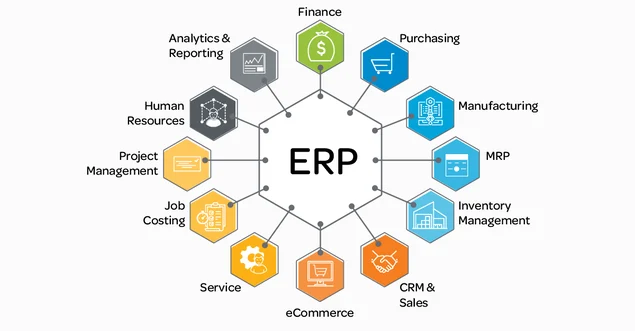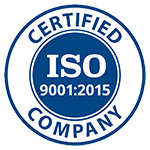ERP Enterprise Resource Planning Software Complete Guide
In this day and age of commerce, each business leaves no stone unturned to minimize redundant work, reduce operational costs, and increase output in every respect. And the remedy for it all is ERP, or Enterprise Resource Planning. But what is ERP, and why is it such an important factor in the success of a business? Let's dive deep into a comprehensive overview of ERP, its features, and how it can change the face of the business world.
Understanding ERP: What is ERP?
ERP stands for Enterprise Resource Planning software that empowers organizations to manage regular activities such as accounting, procurement, project management, risk management, supply chain operations, and so on. In simple words, ERP integrates all business processes in a single system.
With ERP, all data from different departments are unified into one; hence, dissemination and access to information are much easier across organizations. This will help eliminate data silos and enhance decision-making via real-time insights.
Key Features of an ERP System
- Centralized Database: ERP system uses a single location for storing all business-related data, which maintains the consistency and reliability of the data.
- Business Process Automation: From payroll processing to inventory management, it automates many routine processes or tasks that are prone to human error and save lots of time.
- Real-time Analytics: ERP provides real-time access to information and generates various reports on different operations for each business, keeping them agile.
- Modular ERP: Many ERP systems are featured in modular form, which can be implemented according to functional needs and requirements, and one can expand when the business grows further.
- Cross-functional Integration: All departments, including but not limited to finance, HR, and supply chain, work within one system to improve collaboration.
Why Is ERP Important to the Business?
- Improved Efficiency: With the automation of repetitive tasks, the need for human intervention is reduced, freeing up more time to be spent on important activities of a strategic nature.
- Better Decision-making: Real-time insights present leaders with the opportunity to make and execute informed decisions faster, hence becoming more responsive toward market fluctuations.
- Cost Savings: The processes become smooth, reducing errors and operational costs over time.
- Scalability: As your business grows, the ERP systems will equally scale up to accommodate more users or functions with no operational disturbances.
- Regulatory Compliance: Through the tracking of whatever activities are performed within the business, ERP assists organizations in being compliant with industry standards and regulations, reporting if need be.
Industries That Benefit from ERP
ERP systems are workable in almost all industries; however, they have an advantage in:
- Manufacturing: Production Scheduling, Supply Chain Management, and Inventory management.
- Retail: Improvement of customer service, monitoring of sales, and book inventory maintenance.
- Healthcare: Patient care management, resource planning, as well as compliances with health regulations
- Construction: Planning of the project, effective cost tracking, resources management
How to Choose the Right ERP Software
Selection of ERP can be a daunting task; however, with these features in mind selection can be done with much ease.
- Business Needs: Analyze which process requires enhancement or automation
- Scalability: Ensure that the system will grow with your business.
- Customization: Find a system that will have modules customized to suit your needs in your industry.
- Ease of Use: A user-friendly interface allows for easy adoption and use.
- Vendor Support: The ERP vendor will continue to support the system with training to make your team members successful.
- ERP Frequently Asked Questions
ERP Software Frequently Asked Questions
1. What is the use of ERP software?
ERP software is used to manage and integrate main business processes such as finance, supply chain, manufacturing, HR, and customer relationship management. It helps streamline processes and make everything much more efficient. Moreover, it also gives real insight into the business in real time.
2. What types of companies use ERP?
With ERP, companies of any size, from small to large enterprises, are benefited. Companies in manufacturing, healthcare, retail, and construction industries generally recourse to ERP when there is significant complexity in the operation.
3. How does ERP enhance organizational performance?
ERP enhances the organizational performance by centralizing the data, automating repetitive tasks, reducing the error rates, and providing real-time information necessary for decision-making. This eventually improves operational efficiency, saves costs, and enables informed decisions.
4. Is ERP only for large companies?
No, ERP is not for large companies alone. Several ERP solutions exist targeting the SMB market segment, and can be architected to fit different sizes and types of organizations.
5. What are the challenges of implementing an ERP system?
Some of the drawbacks faced by any organization include high initial costs, resistance to change from employees, and integration issues of ERP with already existing systems. However, with proper planning and training, these can be overcome.
The main content of ERP
ERP allows a business to attain perfection in its processes, save on extra costs, and infuses productivity across the board. This is because ERP systems store all the data centrally and further automate the work processes to enable the company to compete in the prevailing economic conditions. Whichever the size of your business-a small one or big enterprise-investing in an appropriate ERP system will definitely pay off for your organization in terms of growth and success.


